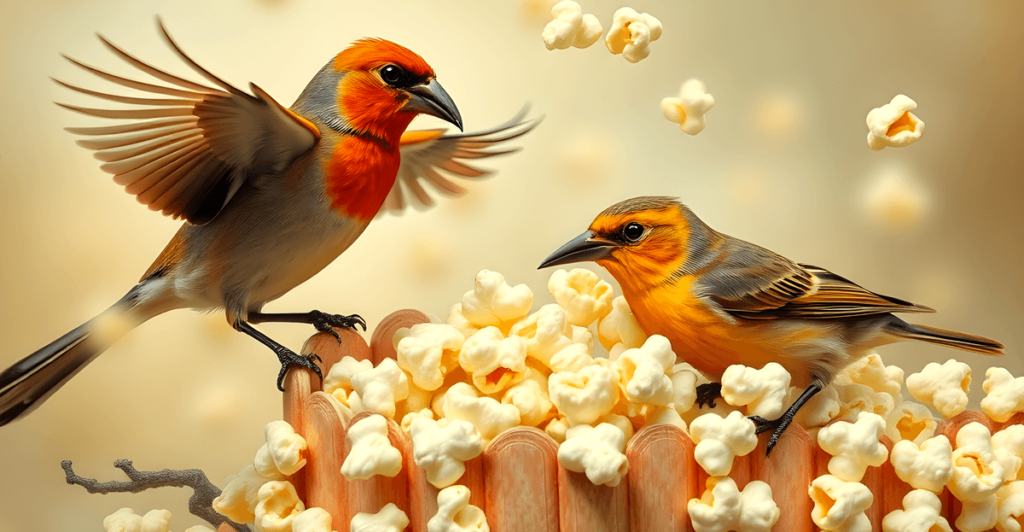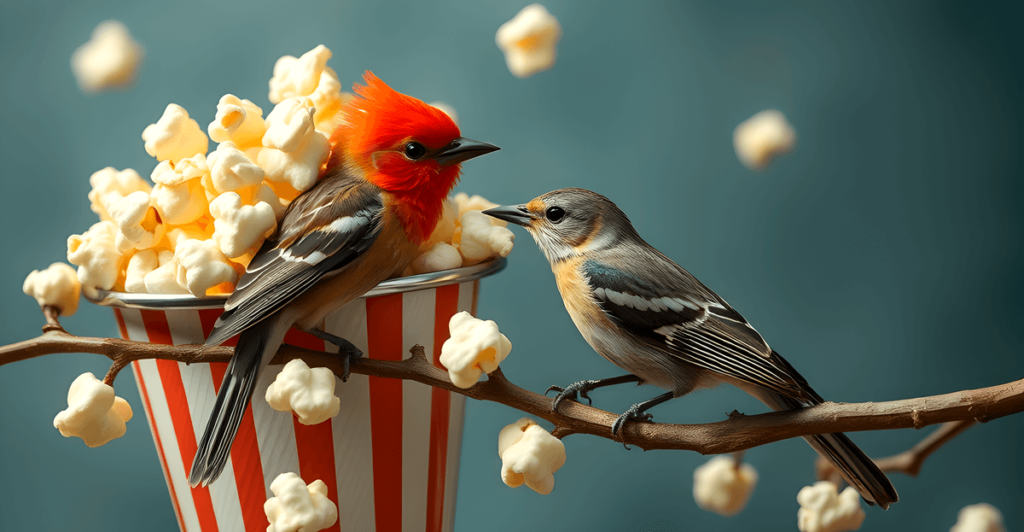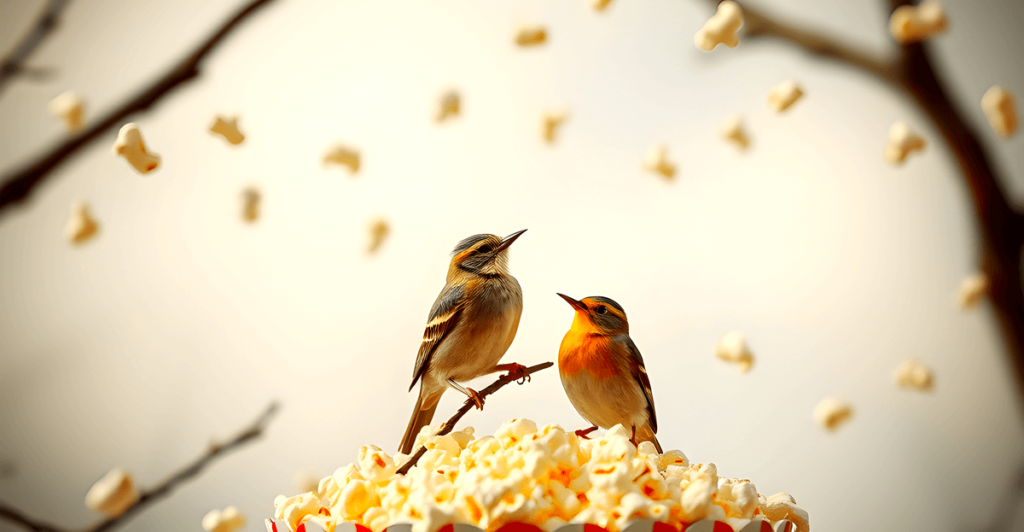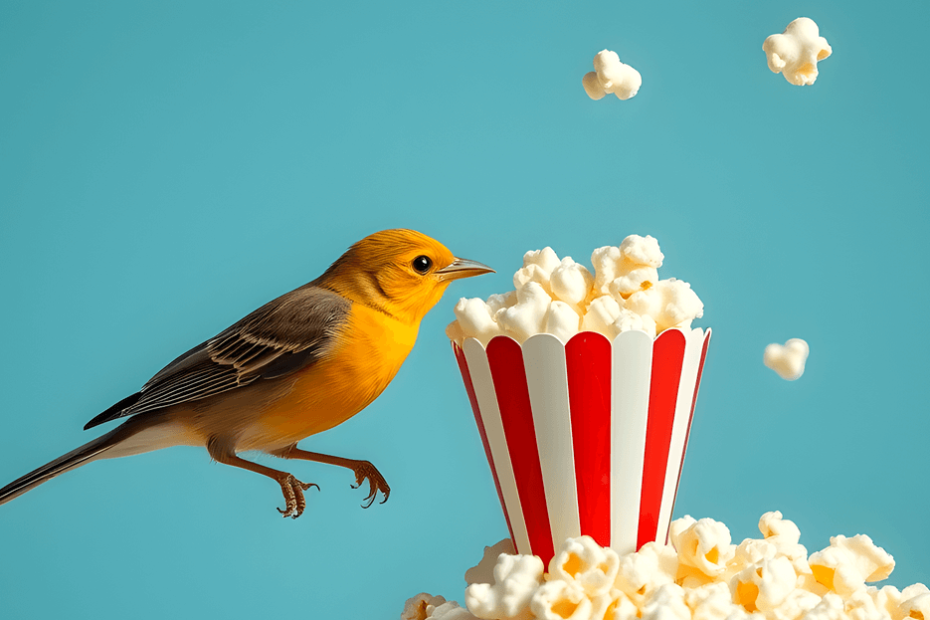Introduction
As a lifelong bird enthusiast, I’ve always been curious about the dietary preferences of our feathered friends. One question that has frequently crossed my mind is: do birds like popcorn? It’s a seemingly simple query, but one that actually has some fascinating nuances and considerations.
In this comprehensive guide, we’ll dive deep into the world of birds and popcorn, exploring everything from the nutritional makeup of this popular snack to the specific types of birds that may (or may not) enjoy it. We’ll also cover practical tips on how to safely and responsibly feed popcorn to the birds in your backyard or even your pet avian companions. By the end of this post, you’ll have a thorough understanding of whether birds truly like popcorn, and how to best incorporate it into their diets.
What is Popcorn?
Before we can delve into whether birds enjoy popcorn, it’s important to first understand what this snack is all about. Popcorn is a type of whole grain that is made by heating kernels of corn until they expand and “pop” open, creating the familiar fluffy, white pieces we know and love.
Nutritional Content of Popcorn
Popcorn is actually quite a nutritious snack, with a decent amount of fiber, protein, and various vitamins and minerals. Here’s a quick breakdown of the key nutrients found in popcorn:
- Fiber: Popcorn contains around 3-4 grams of fiber per 3-cup serving, making it a good source of this important nutrient.
- Protein: Popcorn provides about 4 grams of protein per 3-cup serving.
- Vitamins and Minerals: Popcorn contains small amounts of vitamins like vitamin A, vitamin B6, vitamin K, thiamin, riboflavin, niacin, and folate. It also provides minerals like magnesium, phosphorus, zinc, copper, and manganese.
- Antioxidants: Popcorn is a surprisingly good source of polyphenol antioxidants, which can provide health benefits.
Different Types of Popcorn
While we typically think of classic movie theater-style popcorn when we hear the word, there are actually several different types of popcorn. These include:
- Air-popped popcorn: This is popcorn that is popped using hot air, resulting in a light and airy texture with minimal added fats or oils.
- Microwave popcorn: Popcorn kernels that are packaged and designed to be popped in the microwave using heat and steam.
- Stovetop popcorn: Popcorn kernels that are popped on the stove using a small amount of oil or butter.
- Kettle corn: A sweet and salty variety of popcorn that is often coated in a light sugar or caramel glaze.
The nutritional profile and potential suitability for birds can vary depending on the specific type of popcorn. In general, air-popped and plain stovetop varieties tend to be the healthiest options.

Do Birds Like Popcorn?
Now that we have a better understanding of what popcorn is, the next logical question is: can birds actually eat it? To answer this, we need to take a closer look at the dietary needs and preferences of our feathered friends.
A Bird’s Diet and Nutritional Needs
Birds, like all animals, require a balanced diet to meet their nutritional needs and maintain good health. In the wild, a bird’s diet is typically comprised of a variety of foods, including:
- Seeds
- Nuts
- Berries and other fruits
- Insects and other small invertebrates
- Nectar
- Grains
The specific dietary requirements can vary quite a bit depending on the species of bird. For example, hummingbirds are nectar-feeders, while birds of prey like hawks and falcons are primarily carnivorous. Backyard birds like sparrows, robins, and finches tend to have a more diverse, omnivorous diet.
Potential Benefits of Popcorn for Birds
So, where does popcorn fit into a bird’s nutritional needs? Well, as we discussed earlier, popcorn does provide some beneficial nutrients, including fiber, protein, and antioxidants. In moderation, popcorn could potentially offer the following advantages for birds:
- Additional source of calories and energy
- Fiber to support digestive health
- Protein for muscle and tissue maintenance
- Antioxidants to support overall health and immune function
However, it’s important to note that popcorn should not be considered a replacement for a bird’s regular, balanced diet. It should be viewed more as an occasional treat or supplement.
Potential Risks or Downsides
While popcorn may provide some potential benefits, there are also a few potential risks or downsides to be aware of when it comes to birds consuming this snack:
- Choking hazard: The hard, crunchy texture of popcorn could pose a choking risk, especially for smaller bird species.
- Digestive issues: The high fiber content of popcorn may cause digestive problems or discomfort for some birds if consumed in excess.
- Empty calories: Popcorn, particularly if heavily salted or buttered, can be high in calories without providing much in the way of essential nutrients.
- Unhealthy additives: Many commercially-prepared popcorn varieties contain unhealthy additives like salt, butter, or artificial flavorings that could be harmful to birds.
As with any food, it’s important to exercise caution and moderation when offering popcorn to your feathered friends.
Types of Birds That May Eat Popcorn
Now that we’ve explored the general considerations around birds and popcorn, let’s take a closer look at the specific types of birds that may be inclined to enjoy this snack.
Common Backyard Birds
Many of the common birds that frequent backyard feeders and bird baths may be interested in trying popcorn, at least in moderation. Some examples include:
- Sparrows
- Robins
- Finches
- Chickadees
- Titmice
- Nuthatches
- Jays
These birds are generally omnivorous, with diets that include a variety of seeds, insects, berries, and even the occasional scrap of food from human sources. Offering them small amounts of plain, unsalted popcorn could be an enjoyable treat.
Wild Birds
Beyond the backyard birds, there are also some wild bird species that may show interest in popcorn, including:
- Pigeons and doves
- Ducks and geese
- Gulls
- Crows and ravens
These birds are often quite adaptable and opportunistic when it comes to finding food sources, so they may not turn their beaks up at the chance to try some popcorn, especially if it’s readily available.
Pet Birds
For those with avian companions, the question of whether birds like popcorn takes on a more personal angle. Many popular pet bird species, such as:
- Parrots
- Cockatoos
- Parakeets
- Cockatiels
- Cockatoos
These intelligent and curious birds may very well enjoy the occasional popcorn treat, provided it is properly prepared and offered in moderation. However, it’s crucial to consult with an avian veterinarian or experienced bird owner before introducing any new foods to a pet bird’s diet.
Ultimately, the types of birds that may enjoy popcorn can vary quite a bit, from common backyard visitors to exotic pet species. The key is to approach feeding popcorn to birds with caution and moderation, while also considering the unique dietary needs and preferences of each individual feathered friend.

How to Feed Popcorn to Birds
If you’ve determined that the birds in your life may benefit from or enjoy the occasional popcorn treat, it’s important to know the best ways to prepare and offer this snack to them.
Preparing Popcorn for Birds
When it comes to feeding popcorn to birds, it’s crucial to keep a few key guidelines in mind:
- Use plain, unsalted popcorn: Avoid any popcorn that has been heavily salted, buttered, or coated in other potentially harmful seasonings or additives.
- Skip the microwave popcorn: Microwave popcorn often contains artificial flavorings, preservatives, and other ingredients that may not be suitable for birds.
- Stick to air-popped or stovetop varieties: These minimally-processed popcorn options are the healthiest choices for feathered friends.
- Consider cutting or breaking up larger pieces: Smaller, bite-sized popcorn pieces may be easier for birds to consume and less of a choking hazard.
By following these simple preparation tips, you can ensure that the popcorn you offer to birds is safe, nutritious, and enjoyable for them to eat.
Ways to Offer Popcorn to Birds
Once you have the properly prepared popcorn, there are a few different ways you can offer it to the birds in your area:
- Scatter on the ground: Spreading small amounts of popcorn on the ground or on a flat surface can allow ground-feeding birds easy access.
- Place in feeders: You can also offer popcorn in traditional bird feeders, either on its own or mixed with other bird-friendly foods.
- Hang in mesh bags or suet feeders: Popcorn can be threaded onto strings or placed in mesh bags or suet feeders to attract birds that prefer elevated feeding stations.
- Provide in a dedicated dish: Setting out a small shallow dish or bowl filled with popcorn can make it easy for birds to spot and access.
Regardless of the specific method you choose, it’s important to monitor how the birds in your area respond and adjust the amount and frequency of popcorn feeding accordingly.
Portion Sizes and Frequency
When it comes to feeding popcorn to birds, moderation is key. A good rule of thumb is to offer only a small handful or scattering of popcorn at a time, and no more than a few times per week. Larger amounts or more frequent feedings could potentially lead to digestive issues or other health problems.
It’s also important to pay attention to how the birds in your area respond to the popcorn. If they seem to be avoiding it or exhibiting any signs of distress, discontinue offering it and stick to their regular, trusted food sources.
By following these guidelines and best practices, you can safely and responsibly incorporate the occasional popcorn treat into the diets of the feathered friends in your backyard or local community.
Precautions and Safety Tips
While popcorn can make for an enjoyable snack for some birds, it’s crucial to approach feeding it to our feathered friends with caution and care. Here are some important precautions and safety tips to keep in mind:
Potential Choking Hazards
The crunchy, hard texture of popcorn kernels can pose a significant choking risk, especially for smaller bird species. To mitigate this hazard, it’s best to:
- Avoid offering whole, unpopped kernels
- Break or cut larger popcorn pieces into smaller, bite-sized chunks
- Closely monitor birds when they’re consuming popcorn
Avoiding Unhealthy Toppings and Seasonings
As mentioned earlier, many commercially-prepared popcorn varieties contain unhealthy additives like salt, butter, or artificial flavorings that can be harmful to birds. It’s crucial to only offer plain, unsalted, and unbuttered popcorn to ensure your feathered friends stay safe and healthy.
Monitoring Bird Reactions
When introducing popcorn or any new food to birds, it’s important to closely observe their reactions and digestive health. Signs that a bird may be having trouble with popcorn include:
- Gastrointestinal distress (e.g., vomiting, diarrhea)
- Loss of appetite or refusal to eat
- Lethargy or other changes in behavior
If you notice any of these concerning signs, discontinue offering popcorn and consult an avian veterinarian.

Maintaining a Balanced Diet
While popcorn can make for an occasional treat, it should never be considered a replacement for a bird’s regular, balanced diet. Ensure that birds have access to a variety of nutritious foods, such as seeds, nuts, berries, and insects, to meet all of their dietary needs.
By keeping these precautions and safety tips in mind, you can enjoy the occasional popcorn-feeding session with the birds in your life while prioritizing their overall health and wellbeing.
Alternatives to Popcorn for Birds
If you’ve determined that popcorn may not be the best snack option for the birds in your care, or if you’re simply looking to expand their dietary repertoire, there are plenty of other healthy and bird-friendly treats to consider.
Healthy Bird-Safe Snacks
Some excellent alternative snacks and treats for birds include:
- Unsalted nuts and seeds (e.g., sunflower seeds, peanuts, almonds)
- Dried or fresh fruit (e.g., berries, grapes, apple slices)
- Cooked, unseasoned whole grains (e.g., rice, quinoa, oats)
- Mealworms or other insect-based treats
- Suet or nut butter-based birdfeed cakes
These types of foods can provide birds with a nutritious boost of calories, protein, vitamins, and minerals to support their overall health and well-being.
Foods Birds Commonly Enjoy
In addition to the healthy snack options mentioned above, there are certain foods that many birds seem to universally enjoy. Some examples include:
- Birdseed (mixed or single-variety)
- Nyjer seed
- Cracked corn
- Mealworms or other live insects
- Suet or lard-based birdfeed cakes
- Fruit slices (e.g., oranges, bananas, grapes)
Offering a variety of these familiar and bird-approved foods can help ensure that the feathered friends in your area are well-nourished and satisfied.
Importance of a Balanced Diet
Ultimately, while the occasional popcorn treat may be acceptable for some birds, it’s crucial to remember that a bird’s diet should consist primarily of a balanced, species-appropriate mix of foods. This helps ensure they receive all the essential nutrients they need to thrive.
By incorporating a diverse range of healthy and bird-friendly snacks and foods, you can help support the overall health and wellbeing of the avian visitors in your backyard or local community.
Frequently Asked Questions
Can all birds eat popcorn?
No, not all birds can or should eat popcorn. The safety and suitability of popcorn as a snack for birds can vary depending on the species, size, and individual dietary needs and preferences of the bird. It’s important to exercise caution and moderation when offering popcorn, and to consult with an avian veterinarian or experienced bird owner before introducing it to a bird’s diet.
Is popcorn healthy for backyard birds?
Popcorn can provide some nutritional benefits for backyard birds, such as additional calories, fiber, and antioxidants. However, it should not be considered a replacement for a bird’s regular, balanced diet. Offered in moderation as an occasional treat, plain, unsalted popcorn may be an enjoyable snack for some backyard bird species. But it’s crucial to monitor the birds’ reactions and discontinue feeding if any signs of distress or digestive issues arise.
How much popcorn can I feed my pet bird?
The appropriate amount of popcorn to feed a pet bird can vary depending on the species, size, and individual dietary needs of the bird. As a general guideline, it’s best to offer only small, bite-sized pieces of plain, unsalted popcorn a few times per week, and to closely monitor the bird’s reaction. Consult with an avian veterinarian or experienced bird owner to determine the safest and most suitable portion sizes for your particular feathered companion.
What are the risks of feeding popcorn to birds?
The main risks associated with feeding popcorn to birds include:
- Choking hazard from larger, crunchy pieces
- Digestive issues or discomfort from the high fiber content
- Potential health problems from unhealthy additives like salt, butter, or artificial flavorings
- Popcorn providing “empty calories” without essential nutrients
To mitigate these risks, it’s crucial to only offer plain, unsalted, and minimally processed popcorn in moderation, and to closely monitor the birds’ reactions. Discontinue feeding if any signs of distress or health issues arise.
Conclusion
In the end, the question of whether birds like popcorn is a complex one with no simple yes or no answer. While some birds may indeed enjoy the occasional popcorn treat, it’s crucial to approach feeding it to our feathered friends with caution and care.
By understanding the nutritional profile of popcorn, the dietary needs and preferences of different bird species, and the potential risks and precautions involved, bird enthusiasts can make informed decisions about if, when, and how to incorporate this popular snack into the diets of the birds in their lives.
Ultimately, the health and wellbeing of our avian companions should always be the top priority. By offering popcorn responsibly and as part of a balanced, bird-friendly diet, we can provide our feathered friends with a delightful and enrich
